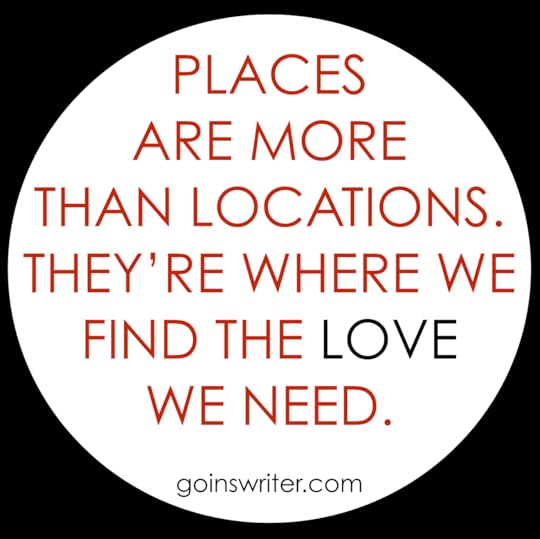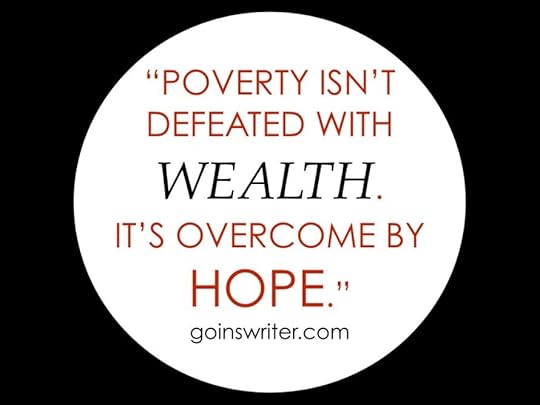Jeff Goins's Blog, page 71
January 29, 2014
The Dirty, Messy Part of a Writer’s Life
I had a real job once. Before I became a writer, I worked for a nonprofit where I learned that the best work is the kind that costs you something. Even though I don’t do that anymore, it’s still part of who I am.
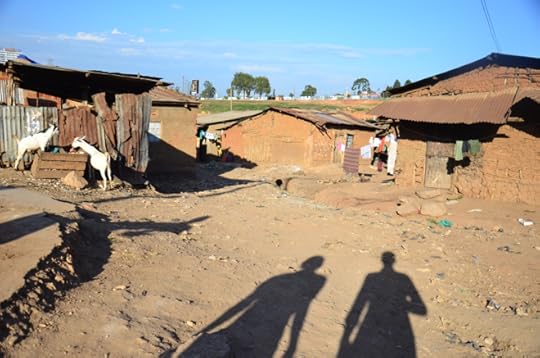
For me, this job of being a writer is not just about the writing. It’s about the difference-making.
I believe in words, in the power and potential they possess, that what we say is significant and it’s up to us to share our stories. But I also believe there comes a time when you can’t just write about life. You have to live it. Even when it scares you half to death.
That’s what today was about.
The lives we live become the stories we tell
A good writer is more than a scribe. She doesn’t just catalogue people’s stories; she endeavors to live one herself.
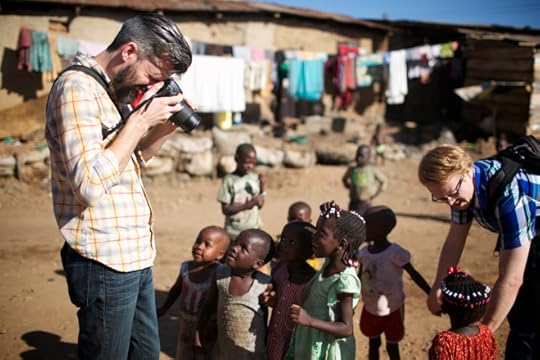
And the good news is we all have a story to tell. The challenge isn’t learning to tell it; it’s embracing the conflict necessary to make the story happen in the first place. Because what’s a story without conflict?
What I’m trying to say is this: The times that scare us the most are the ones we should be looking for.
Like the time two dozen kids mobbed me in Africa, nearly trampling each other in the process…

Or when my friends and I were greeted by a private parade in the worst slum in Uganda…

Or the time I saw despair in the eyes of an HIV-positive mother worried about paying her rent.
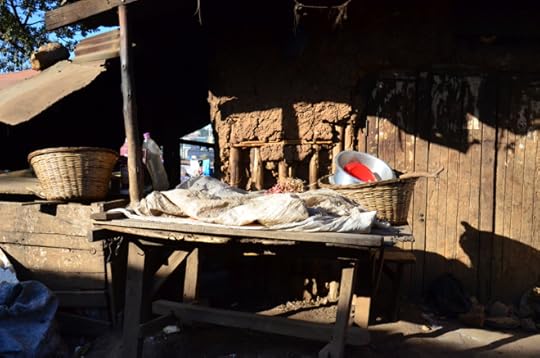
Oh yeah… that was all today.
Some days are like that, more than you can handle or process on your own. From time to time, we all experience things that leave us speechless, threatening to stop us in our tracks.
You don’t have to hop a plane to Africa to feel overwhelmed or occasionally want to to check out. That’s part of being human.
Life can be hard and sometimes scary. When you’re staring pain or discomfort in the face, it’s easy to retreat. To hold back emotionally, make quiet rationalizations, and numb yourself to the pain. But that’s exactly what we must not do.
Everything I’ve ever learned about writing (wasn’t about writing)
Some people think this blog is about writing. It’s not.
This is a blog about being a writer, the struggles a person faces when chasing the craft and how to overcome them. And every time I think I’m learning something new about writing, it ends up being a lesson about life.
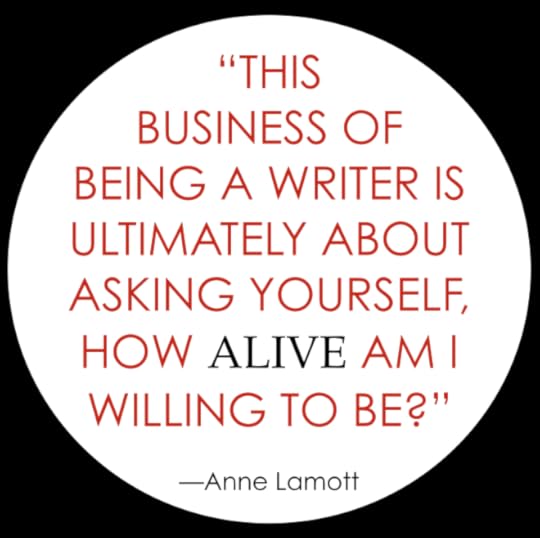
A few that came to mind today, as I walked through the slums wondering what to make of everything I saw, were:
When you start to feel afraid, press in. The good stuff happens when we least expect it.
No matter what, be present. The tricky part of life (and the secret to great art) is paying attention — embracing the everyday, imperfect right-now, and then making something of it.
Get dirty often. Every first draft is ugly, all good writing is rewriting, and a great life comes from making mistakes. The point is to get on with it.
So what do I do as a crowd of children rushes towards me, shouting, “Muzungu, muzungu!”? Or when my arms give out from swinging these little ones around and round as they scream for more? Or when I start to shut down from sensory overload and my own sense of inadequacy?
Do I retreat, look for the door, daydream about dinner?
Honestly, sometimes I do all of the above. But I also try to remember this was what I signed up for. When I set out to make art, I didn’t want clean and safe and comfortable.

I wanted reality, even when it was raw and gritty and true.
So as I finish my day, the dirt I scrub off the palms that shook a hundred hands reminds me I did my job today. I showed up, got dirty, and did some things that scared me.
What we avoid is what makes us grow
For all of us, there are moments we’d rather avoid. Maybe it’s the baby waking up the third time in a row before sunrise or the intimidation of the blank page, but we all get scared sometimes.
And that’s okay, as long as we don’t get stuck.
When discomfort comes, we’re tempted to rush through, thinking tomorrow will be better. But this moment is not an inconvenience or setback. It’s the best stuff life has to over.
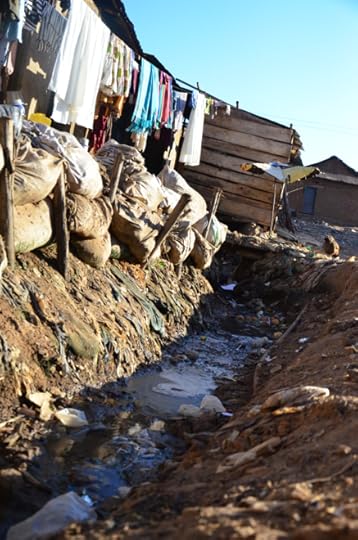
Somewhere in the mud of life, whether it’s cleaning baby puke off your shoulder or trying not to freeze up in the slums of Kampala, there’s something both to savor and struggle with.
Long before the resolution, we learn an important virtue: to not quit.
Jump into the mess
Shaun said something to me today after we finished meeting the mom with HIV. Despite everything Compassion has done for her and all the measures they’ve taken to help her, it just isn’t working.
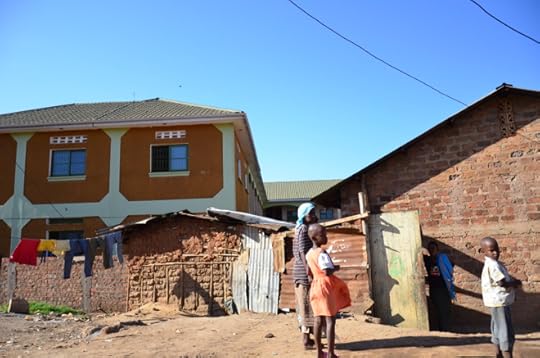
In a moment of honesty, he admitted:
This compassion stuff is messy. It’ll rip your heart out.
What do we do when words are not enough, when plan falls apart and you’re wondering whether this was something you were called to at all? Maybe that’s the wrong question to ask.
Anybody can do nothing. It’s normal to give in to paralysis and resign yourself to inaction. But that’s not what makes for a great story.
What great writers do, and maybe great people, is they step into the mess. They do the difficult job of caring, not just about what they do but who they do it for. And that’s something rare.

Which is why I don’t hesitate to encourage you to sponsor one of these children and why I feel comfortable sharing these thoughts with you on a blog supposedly about writing. Because writing, as much as I love it, isn’t enough.
What good is art without a life to support it? And what good is a life without a story to guide it? [Tweet that]
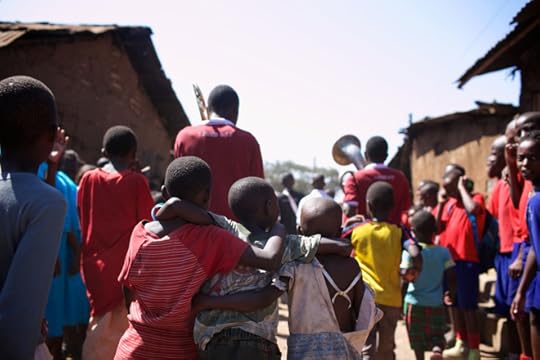
So whether you make art like me or not, you are making a life. And an important question, perhaps the question to ask, is what is it costing you? What uncomfortable thing are you doing today?
How are you pressing into fear, being present here, and getting your hands dirty in the process? Answer that, and you’ve got a story to tell the grandchildren.
A good place to start, one that I have seen visible, tangible evidence of would be to sponsor a child through Compassion.

Despite how small $38/month may seem, it makes a tremendous difference in the life of a child. I saw the evidence today in the lives of slum children who now have school uniforms and books and a hope that defies circumstances.
I have been changed by it, and I hope you are, too. (If you do, shoot me an email — I want to personally thank and congratulate you.)
Note: I’m in Africa this week on a trip with a group of bloggers. You can read other updates by Emily, The Nester, Joy, Shaun, and Bri.
What does stepping into the mess of life look like for you? Share in the comments.

January 28, 2014
The Meaning of Life in Three Parts
On the other side of the world, fighting jetlag and a little bit of culture shock, I’m surprised not by the differences I see, but the similarities.
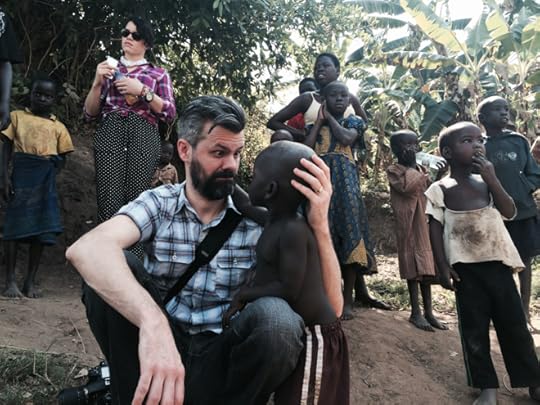
On this trip, I’m struck with a truth that sticks to my soul: No matter where we go, people are just people, and despite our differences, we have more in common than meets the eye.
We all want essentially the same things in life, and today I saw them more clearly than ever before.
Part 1: A friend to walk with
With expectant eyes, we watch as the pump fills the yellow tanks, neighbors and villagers huddled around to join in the watching. A child has led us here, down the mile-long path she hikes each morning to fetch water for her family.
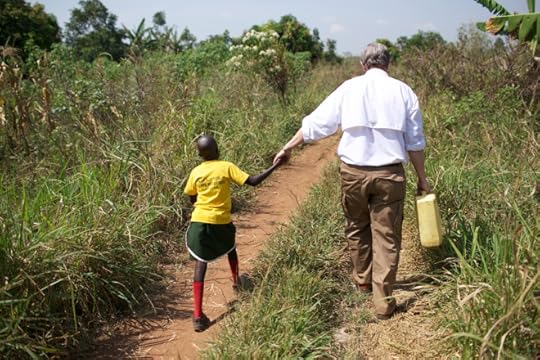
I try to imagine having to walk farther than across my kitchen for a glass of water, but I can’t. The best I can do today is take the journey with her, trying to lighten the load at least for today by carrying a container.
At the well, there is more than dry mouths to be quenched. There is life, the kind that watches your chickens and protects your kids when they wander into someone else’s cassava field.
The kind called community.

We head back the way we came and the irony hits me hard.
Carrying these jugs of water, we were hoping to quench a family’s thirst, but as we stop along the way to visit with those who welcome us into their fields and homes, we are the ones who are refreshed.
Part 2: A dream to share
Back at the house, I ask Sam (whom we met yesterday) to show us his shop, and he leads us to a small storefront along the road.
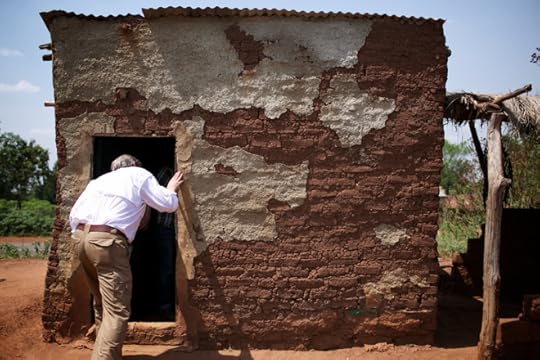
I pepper him with questions: What’s your profit margin on this item? How many of these do you have to sell before you can restock? How are you tracking your expenses?
He answers them all.
So I ask another, one I’m sure he doesn’t know the answer to. After reading hundreds of business books, it’s the question that many say holds the key to success. And how would a man in the middle of the African bush know that?
What’s your ultimate goal? How will you know when you succeed?
His answer is immediate. He wants to earn enough money to build a house and send his son to a school with a special needs program. Not only does he know the goal; he understands exactly what it will take to achieve.
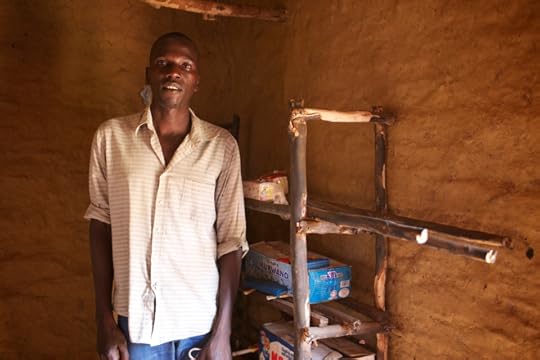
Seeing his conviction, I know it’s not enough for Sam to survive. The human spirit must do more than endure; it must thrive. And the only way to do that, to live fully, is to commit to a cause that is bigger than you, something you can devote yourself to fully.
With admiration, I look at this man, a man who works hard and cares for his family, the best kind of man there is, and I tell him his dream will come true.
Why? Because he believes. Because he understands. Because he wants it — not for himself, but for those he loves.
Is there a nobler cause than to see your dreams not as trophies to be boasted but as blessings to be shared?
Part 3: A place to belong
A little while later, I see how one seemingly small choice can have a ripple effect halfway around the world.

At first, she is shy. But with the help of a translator and some ridiculous gestures on my part, Miriam finally cracks a smile. We have only been sponsoring her a month, so we are just getting to know each other.
She loves coming to the center, because she learns many things, like Bible stories and songs, even a few games she tries to explain but I don’t quite understand.
Here, she belongs.
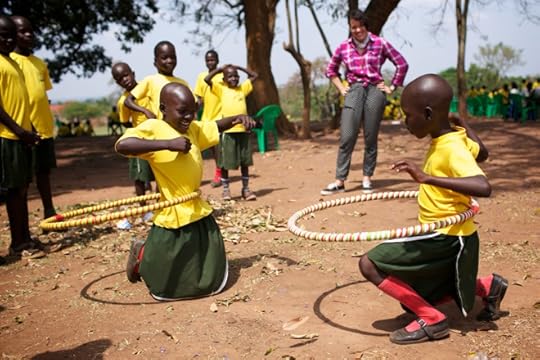
We talk and the children swarm around us, laughing at my attempts to speak the language. Hula hoops swing in circles around necks, and half-deflated soccer balls roll across the distant field.
The air is bubbling with hope.
We all need a place like this, somewhere to belong and dream, where we can be who we are and someday might become.
And in this way, places are more than locations; they’re where we find the love we need.
She wants to be a nurse when she grows up. I tell her she must keep going to school, that she cannot drop out as some do at a certain age. And then I decide to make a deal.
“Miriam, will you promise me something? Will you keep going to school so that someday you can be come a nurse?”
She thinks, then nods, “Mmh.”
“Okay. And I will promise to keep sponsoring you — until you become a nurse.”
I try to not make it sound like an ultimatum — it’s not. Our support is unconditional, but I want her to know someone is watching her, paying attention to what she does, and dreaming her dreams along with her.

As we shake hands, there is a sense of commitment, a bond we’ve made to each other that neither wants to break. I feel the weight of the words as we smile, hug, and say goodbye.
And now, I see the whole picture.
“What we do,” Wess tells me, “goes beyond sponsorships. That’s just the beginning. What really makes a difference in a child’s life is your involvement. The letters you write and gifts you send will change lives.”
My wife and I make monthly contributions to Miriam, but the gift is not the money. It’s the relationship. The blessing wasn’t the check we mailed; it was the chance to be a part of her life.
The hope you can’t escape
The word hope gets used so often it can come off as cliche. I wish there were a better word to describe today, but I haven’t found it.

Hope is intoxicating in what it makes possible. And in Africa, it seems more tangible than just about anywhere else in the world. This place is a picture of what could be, a fantasy that comes true a little more every day.
Here, hope lures you into its grip and won’t let you go until you are changed.
It grabbed hold of me today, and I hope it gets you too, pointing you to the possibility of another world, reminding you of the important things:
That we all need someone with whom to share the journey, and sometimes burdens, of life.
A cause will carry us further than any competitive spirit could.
Without a place to belong, we will always be searching for our identity.
And may you, too, be transformed in the process.
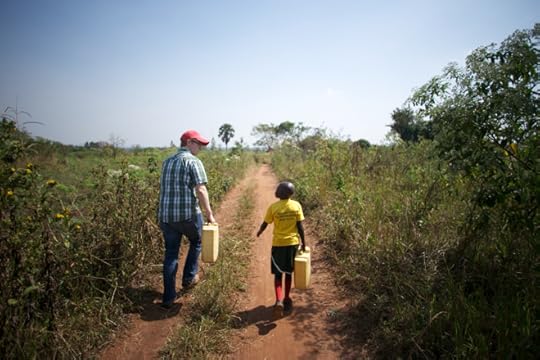
More from our group in Uganda
What It Means to Boil Water [Joy the Baker]
How to Have a Happy Home [The Nester]
A Day in the Life. Ish. [Emily Freeman]
What Good Dads Do [Shaun Groves]
To change a life, and I mean yours, go sponsor a child with Compassion and see what a difference it makes.
What’s the meaning of life to you? And what questions do you have about our trip? Share in the comments.

January 27, 2014
What Hope Looks Like
I’m not sure what I was expecting when visiting my first mud hut in the middle of Africa, but this was not it. I wasn’t expecting hope.
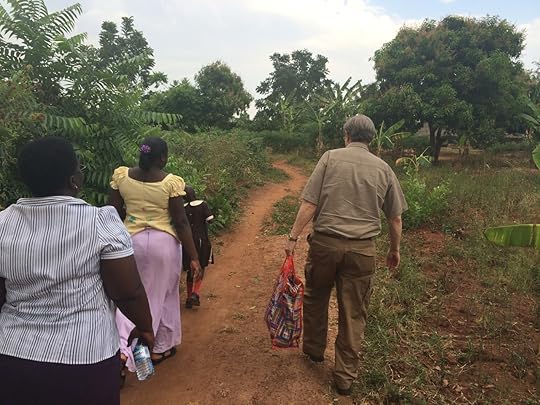
“Is this where you live?” Wess asks the little girl as we march up the dirt path to her home.
Otherwise stoic, her attitude brightens a little as we reach the top of the hill and are greeted by her parents — at least, we thought they were her parents.
Sam, the man of the house, is quick to correct this misunderstanding. Nine year-old Kevin is his sister-in-law. He and his wife, Christine, took her in after the mother disappeared. She suffers from mental illness and has the unfortunate habit of abandoning her children.
Sam and Christine have decided to raise Kevin as their own. And when you ask them about this or praise their kindness, they get embarrassed. But ask them about this little girl and their hopes for her future, and their eyes shine.
Hope comes in unexpected places
I am surprised by what I see here.
Three sturdy mud huts with thatched roofs make up the family’s home: one a kitchen, and the other two a couple of bedrooms. As we tour the premises, I notice each building is well kept, the floors neatly swept and things put away where they belong.

There is a familiar order here, a pattern that feels like home.
The place is modest, but you can tell they take great pride in what they have. Despite my expectations, I don’t feel sorry for them. They don’t need my pity; they have something better.
Life is tough here, there’s no question about it. This past year, the couple lost a twin baby boys, a wound they are still healing from. Their son, Augustine, is deaf and dumb. And they don’t have access to opportunitites that would certainly make life easier.
But there is hope in this place, I can feel it.
I ask what the family does for fun, and the translator stares at me, looking confused until I repeat myself. And then Sam answers the question:
We do everything together. And to us, it is fun.
His dream is to someday build a house and get more land to farm. He already has several crops and runs a storefront by the road, but the opportunity to do more for his family is what spurs him on.
It’s this belief in what could be that fuels him.
Poverty is a mindset
I have seen poverty. I have been to slums and stared despair in the face. I have encountered inescapable despondency. This is not it. This is something different. Something redemptive.
Poverty, as I understand it, is more than your economic situation or a lack of resources. It’s a mindset.
That feeling of utter helplessness, of being stuck in a situation from which you cannot escape — that’s what it means to be poor.
There are people in this world who lack basic necessities, who need legitimate help, but that in itself is not poverty. Poverty is an attitude that crushes your spirit.
And as I sit down with this family, I do not see poverty. I see possibility.
When we come into Kevin’s room, she is still guarded but trusting enough to show off her dress collection. She proudly points out her favorite one, which her sister tells us was provided by a child sponsor from Compassion.
Christine tells us how the sponsor also provided gifts that have allowed the family to buy some goats, pay for school, and meet other needs. Which, she admits, they could not have managed on their own.
Such relief is financial in one respect, but without the family’s faith, their belief that things can get better, the gift would be short lived.
I’m beginning to understand that poverty isn’t defeated with wealth; it’s overcome by hope. [Tweet that]
The power of possibility
As we get ready to leave, Wess looks at Kevin, who hasn’t smiled once the whole visit, and then turns to the couple to say:
Sadness can destroy a child’s spirit.
If you’ve ever been wounded, you know how tragedy robs a person of her innocence, how it can deprive you of your expectancy of good things. And the scars of childhood take the longest to heal.
It would be easy to look at Kevin’s situation and see despair, but you wouldn’t be looking closely. You might miss the fact that she no longer prefers to eat garbage over table food or that she’s writing and socializing now, even singing and dancing, when two months before she could barely write.
She can still be hostile and difficult, but she is also learning to play with others. And behind her aggression is a deeper story: there’s still more healing to come.
Although there is deep pain, suffering that cannot be cured by platitudes, there is also possibility. And that doesn’t look like poverty to me. That looks like hope.
Before we go, Kevin tells us what her dream is: to become a teacher so she can help children just like her. And I recall something someone said over dinner last night:
“When you help the poor, they always find a way to help others in poverty.”
The gift of hope
Today, I saw the power of what a simple gift can do and how hope comes in little, unexpected bundles of action.
Kevin’s life, and her family, is being transformed — not in great, big Hollywood ways that we sometimes expect, but quietly and slowly as most true change occurs.
And why is this happening? Because someone halfway around the world decided that she mattered. That hope was a possibility for her, too. And this person took action.
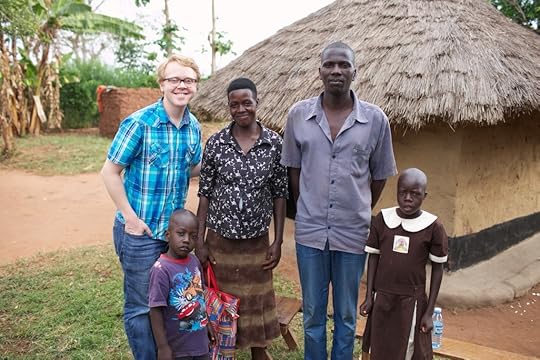
Today, I saw what happens when kind people do brave things, and I want to be a part of that. Maybe you do, too. I don’t know what that looks like exactly, but it probably begins with realigning our definitions of wealth and poverty.
And if you’ve been stirred, as I have, to take further action here are a few more things you can do:
Share this story with a friend. Tweet it, share it on Facebook, or forward it to a friend.
Read the rest of our team’s stories: The Nester, Joy, Emily, Shaun, and Bri.
Take action by sponsoring a child in Uganda through Compassion. My wife and I just did this, and I’ll be sharing with you tomorrow what it meant to meet this little girl face to face.
What’s an example of a poverty mindset in your own life? How did the power of possibility change that for you? Share in the comments.

January 25, 2014
Why I’m Going Halfway Around the World to Blog
Today, I leave for Africa. I’ve never been there before, and honestly, this is the most nervous I’ve been about overseas travel in a long time. So why leave my family for a week and half with nothing but a backpack, my laptop, and a few changes of clothes?
 Photo Credit: evilsoapbox via Compfight cc
Photo Credit: evilsoapbox via Compfight cc
For the next 10 days, I’ll be visiting several cities and villages in Uganda and Kenya and writing about the whole experience. Here’s why:
Because writers must live an adventure
It’s not enough to just write; a writer must live, too. I’m not saying you have to create the most epic experiences ever, but there comes a time when you must reconnect with the things that inspire you in order to write them honestly and well.
For someone who writes about making a difference, that means occasionally stepping out of my comfort zone to reconnect with what matters most. Without a life worth writing about, words start to become stale and meaningless.
Because of Miriam
Last month, my wife and I decided to sponsor a child through Compassion, a nonprofit organization that seeks to eliminate child poverty in the world.
This past year, we’ve been blessed more than we deserve, and it doesn’t feel right to not share those blessings with those in need. For less than $40 a month, we’re able to change a child’s life — that blows my mind.
On the first leg of this trip, I’ll be meeting Miriam, our sponsor child. Part of the reason I’m going is to share the stories I encounter and to encourage you, if you feel called, to find your own Miriam.
(FYI: There will be no coercion or guilt-tripping, just honest story-sharing. Do with that what you will.)
Because this isn’t about me
Ever since a life-changing study abroad experience in college, I’ve loved traveling. I’ve been to Taiwan, Italy, Portugal, France, Spain, Costa Rica, Mexico, Puerto Rico, Guatemala, and maybe a few other places I’m forgetting.
I travel not just to have an adventure but to gain perspective — to remember that the world is bigger than my blog and that I am still a work in progress.
Someone once said you don’t climb a mountain so that the world can see you. You climb a mountain to see the world. I believe the same is true for a platform:
You don’t build a platform so that people can make much of you; you build a platform to change the world.
The last leg of my trip will be a four-day trip through Kenya, where I’ll be visiting the entrepreneur center that we helped fund (and “we” means all of you who took my Tribe Writers course and/or gave a generous donation).
Let’s take this trip together
When I first started this blog, I thought I was just creating a way for people to read my words. Little did I know what was being started, in spite of my mixed motives.
But once folks start connecting to content, a community is formed. And with community, you can do incredible things. Things like change kids’ lives and make an impact on a community halfway around the world.
That’s what this blog is about: not just an opportunity to make much of me or even to teach you to be a better writer. What I’m trying to do here is convince you of something I’m just beginning to realize: that your words matter more than you realize.
And words plus action make for a powerful, sometimes beautifully dangerous, combination.
I hope you follow this trip (the best way to do that is to subscribe via email to this blog). I’ll be writing and publishing more than usual, but my hope is you’ll stick around for the whole journey.
It’s going to be something that hopefully changes all of us.
When is the last time you did something that scared you? share in the comments.

January 24, 2014
Writers Don’t Write to Get Published
Many writers write for the wrong reasons — for accolades or awards — and they end up sorely disappointed when their art doesn’t “succeed.”
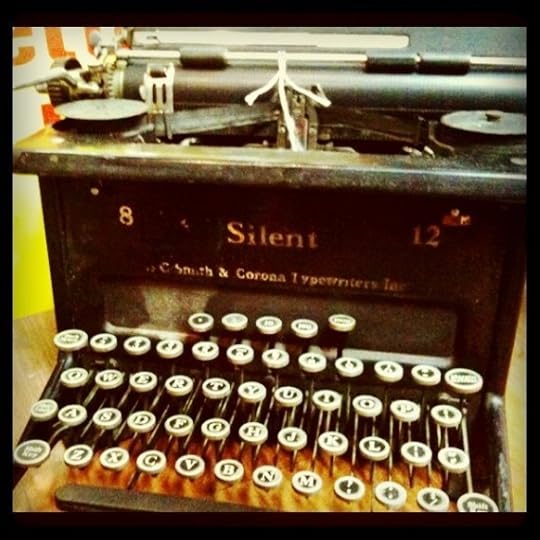
What I think you should do instead is this: stop writing to get published, and start writing because you love it. Here’s a little manifesto I wrote for you:
The Writer’s Manifesto
Real writers don’t write to get published. They write just to write.
Real writers don’t write for recognition or fame or notoriety. They write, because they simply cannot not write. By their gifts and a higher calling, they are compelled to create.
Real writers wake up every morning with something to say. And they thank the heavens for an opportunity to do so.
Real writers do not begin the day with aspirations of seeing their words in print; they simply show up, available to be used as a mouthpiece.
Real writers do not need audience or inspiration; they have the Muse.
Writing as an incarnational act
I don’t think I’ll ever approach writing the same way again after reading Madeleine L’Engle’s Walking On Water. She helped me understand that writing (or any creative effort) is what she calls an “incarnational activity.”
When you write, I believe you embody a part of the spirit of God the Creator. It is a sacred act, to create — not a means to an end, but the end itself.
This means that the whole point of writing is, well, to write. It sounds redundant, but it isn’t. By this rationale, to write with the goal of getting published for the sake of being famous is selfish, if not downright blasphemous.
Writing for the wrong reasons
Let’s face it: we all have some mixed motives for wanting our content to be read by the masses. We put such hard work into what we do, it’s tempting to want a little recognition. Isn’t it?
So we write, because we enjoy it but also because we want to be recognized and celebrated. This is a natural feeling, but also a self-destructive one.
We begin to focus on the audience more than the act of creating, and ultimately, our art suffers. We grow self-conscious and worrisome about how a certain word or phrase will be perceived. It becomes less about the art and more about how much other people like us.
If you can’t write and experience fulfillment through the sheer act of creating, you’d better give up now. You’re probably not writing for the right reasons, and you can’t expect to get much longevity out of it that way.
Must love… writing
Any passion you practice must be sustainable. And when you do something primarily for the acclaim of others, it hardly ever lasts.
If you cannot learn to love writing, consider moving on to another hobby. This one is not for you, not as a serious vocation, anyway.
You may still occasionally write this or that, but if all you want is to get published, then hire a ghost writer. Or learn how to enjoy writing for what it is — an arduous and sometimes tedious process of continually dying to yourself and being reborn. It is painful and glorious all at the same time and not to be taken lightly.
Writing for the right reasons
Please do not write to get published.
Write because you’ve been given a voice and something to say.
Write because you simply must do so.
Write because someone else will not.
The paradox is that if you write for these reasons and with daily discipline, you just might get published some day. In the mean time, write because you love it.
Want to read more? Check out the eBook that this post inspired: Get a Free Copy of The Writer’s Manifesto!
How have you struggled with mixed motives in your own creative work? Share in the comments.

January 22, 2014
Stop Being Afraid
You need to do something for yourself today: Make the decision to stop letting fear rule your life.

Photo Credit: VinothChandar via Compfight cc
Stop hesitating.
Stop wavering.
Stop questioning.
Tell the voices of opposition to shut up. Refuse to be ruled by Fear. And then, get on with what you were born to do.
What is Fear?
Fear is avoiding a tough conversation you need to have.
Fear is asking for advice when you already know what to do.
Fear is waiting for more information before acting on what you already know.
Instead of being afraid, we must be courageous. But, as you probably know by now, courage isn’t the absence of Fear; it’s the willingness to face it in spite of your feelings.
Of course, fear is natural, a biological against things that could do you harm. In that respect, fear can be good.
But that’s not the kind of Fear I’m talking about.
The Fear you and I experience when we say we want to write a book or go into business for ourselves is personal and vindictive. It knows our secrets and faults and gladly holds them against us.
When it comes to this type of fear, we are afraid of too many things. Things that are actually good for us. Things like letting ourselves fall in love or chase a dream.
The risk feels great, so our survival instincts kick in. Our “fight or flight” response is triggered, and we decide to run.
But if you are going to do important work in this world, you cannot run away. You must stay and face the fear, disciplining yourself in the art of fearlessness.
How to become unafraid
What does this look like? How do you actually face Fear? Not by waiting for it to go away.
You become unafraid by standing up for what matters to you. Courage, then, is not the absence of fear; it’s the byproduct of action.
Want to be brave? Do the right thing, anyway. Start now, not later. Take chances, climb mountains, dream big. And slowly, courage will begin to replace the knee-jerk reaction to run. Bravery eventually becomes second nature.
It may never be easy, but you can train yourself to not be paralyzed by Fear.
What we’re talking about here — your decision to quit your job, become a better spouse, or make a difference in the world — this is epic stuff. The stuff of heroes.
We need you to get over your insecurity and move forward. The stakes are too high to linger in the land of indecision.
The only fear worth having
Over time, as you do this, you may find yourself becoming less afraid of what used to petrify you. As Franklin D. Roosevelt once famously said:
The only thing we have to fear is fear itself — nameless, unreasoning, unjustified terror which paralyzes needed efforts to convert retreat into advance…
That arch nemesis that once would’ve destroyed you, will now seem more like an inconvenience than a debilitating force. You’re in control now, too scared to go back to the old you that was paralyzed by risk.
The cost of being un-heroic is just too great — you’re done with that. You have nothing to gain by not facing your fears today and everything, including your dream, to lose.
You must decide. You must commit. Face your fears.
What’re you afraid of? Share in the comments.

January 18, 2014
How to Stop Sounding Stupid and Write Like a Pro
I have a passion for words, for meaningful and remarkable communication. It’s a cause near and dear to my heart. So it drives me bonkers when people waste what they have to say on poor delivery.

Photo credit: Creative Commons
In this increasingly connected world of email and social media, it’s more important than ever to write well. To communicate in a way that is both professional and intelligent.
To help get you started, here are some quick tips on how to write like the pro that you are:
1. Avoid commonly misspelled words
There is a very difficult (and painful!) way to avoid this pitfall: learn how to actually spell. If you don’t know where to start, begin with this list of commonly misspelled words.
2. Do some real proofreading
Never substitute an automatic spell checker for real editing and proofreading.
To see what happens when you do this, watch this video on the importance of proofreading. It’s hilarious. And true. Proofreading is impotent — er, I mean, important. Don’t neglect it.
3. Write to your audience
Knowing your audience is essential. How else can you know if your writing is relevant?
If you don’t know to whom you’re writing, do some research. Even an informal survey can give you a lot of great information. Take some time to get to know your readers. They’ll thank you for it by not ignoring you.
If this sounds like selling out, do what I do: write for an audience of one (yourself), believing that there are other people out there just like you (there are).
4. Never settle for the first draft
FACT: All first drafts suck. If you’re calling your first draft your “final draft,” then you’re settling for less than your best work.
Often, when I write a preliminary draft, I end up cutting it down a lot in editing. Learning to slice and dice your content is essential to getting a great final draft.
Nothing’s as good as you think it is the first time around. Do the hard work and make it better.
5. Get an editor
Have someone besides yourself review your writing to check for errors and readability. There are plenty of online proofreading services that can do this for you. Just ask Google.
6. Write with authority
Regardless of how confident (or insecure) you may be, write with conviction, as if you know what you’re talking about. You know more than you think — I promise.
Avoid using phrases such as “I think” or “I believe” in excess. Of course you believe what you’re writing. That’s why you’re writing it. Just say it, already. If you write with authority, you will win people’s trust and loyalty.
7. Never use words you don’t know
What you must absolutely avoid is phoniness. The best way to do that is to stop using words and phrases you read in a novel once and still don’t understand what they mean. It will sound contrived, and you will probably misuse them. (Excessive use of the phrase “When in Rome…” from Anchorman comes to mind.)
Introduce new words into your vocabulary in moderation, and make sure you know how to use them properly. Your audience will thank you.
8. Don’t try sounding smarter than you are
If you want to sound smart, get smarter — and then write from the heart. But please don’t be pretentious. If you are smart, people will pick up on it. No need to try and prove it to them. You can write with both conviction and humility, after all.
They’re eight simple tips, but following them will make your writing much tighter and hopefully will make you sound a little smarter in the process. (Help your friends on Twitter get smart, too.)
What tips for not sounding stupid when writing do you have? Share in the comments.

January 14, 2014
Why You Should Start Building Your Email List Now
Every writer wants her words read. Every speaker wants to be heard. Every artist wants his art to change something. Right?

Photo credit: DeWitt Clinton
But so many communicators don’t get the attention they deserve. Their messages fade into oblivion and irrelevance. Why?
Because they neglect the single most important element to building a tribe. They forsake one simple, but essential marketing asset: the email list.
How big is your email list?
I was talking to my publisher the other day about marketing strategies for my next book, and do you know the first question they asked?
How big is your email list?”
Not: “How many RSS subscribers do you have?”
Or: “How many ‘hits’ does your blog get?”
Nope. None of that. Just email — the most important tool you need to get your message heard.
Musicians use it to get word out about their next tour.
Writers use it to announce an upcoming book.
Retailers use it to share special deals and drive sales.
It’s all about the list.
The “death” of email
Wait a second. Isn’t email dead? In a word: no.
The reports of my death have been greatly exaggerated.
If email is dead, then why does every major social network ask for an email address before you can create an account? Why do most people, despite what productivity experts say, still check email first thing in the morning?
Because email is still the most powerful way to communicate online.
Every day, people check their inboxes (often multiple times per day). They sit in front of a screen, glued to Outlook or Gmail, refreshing until they get that gratification of knowing someone else in the world cares about them..
No, email is not dead. It is very much alive. And being almost as old as the Internet itself, it’s not going away anytime soon.
In spite of bogus predictions, email continues to stick around, outlasting many of the fads that have come to replace it.
An evolution of email
According to a 2012 study, email is still an important of many people’s work lives, with the average person spending up to 50% of their time in the inbox.
Some other interesting facts about email:
The average worker receives 11,680 emails per year with an average of 32 per day.
42% of all email in a person’s inbox is considered essential or critical.
Email is still considered by most to be the best collaboration tool for teams and individuals.
People use email for more than sending messages: 76% use it to exchange documents and 50% to archive important messages.
Although far from perfect and ever-changing in this world of new and innovative technology, email still plays a critical role in a most people’s lives. Barry Gill from the Harvard Business Review says this:
Email is not dead, it’s just evolving. It’s becoming a searchable archive, a manager’s accountability source, a document courier. And for all the love social media get, e-mail is still workers’ most effective collaboration tool.
With nearly 3.9 billion accounts in the world (according to Radicati), three-quarters of which are consumer accounts, email is far from dead. That number is projected to reach 4.9 billion by 2017.
If you’ve been spurning the idea of building an email list because it seems like an outdated technology, it’s time to face the facts. Email isn’t going anywhere.
The benefits of an email list
Email is king. It’s the best way to build an engaged audience, sell a product online, or create hype around your next big event or service project. Without it, you will really struggle to get the kind of traction your message deserves.
As a writer, I get more “mileage” out of my newsletter than any other platform I have — including this blog.
When I send an email to my list, I often get hundreds of replies — far more engagement than many of my blog posts get. If I send a link to my email list, people click it. If I ask a question, people answer. If I talk about my new book, people buy.
Why is email so powerful? Three reasons:
Email is personal. It’s casual and friendly — a great way to build trust with people.
Email is direct. No middlemen. Your message: delivered straight to your audience.
Email is private. People can be themselves and openly share what they’re struggling with, what they want, or questions they have (unlike public comments on a blog post, for example).
If you haven’t tapped into the power of a good email list, you’re missing opportunities to engage with people who want to hear from you.
Building your list and what comes after
Now that you’re motivated and see the benefits of building an email list, how do you get started? Here’s what you need to do:
Get a good email service (like Mailchimp or Aweber). If you are on a tight budget, you could use Feedburner, but it has limited tracking. (Note: Mailchimp is free up to 2000 subscribers, and Aweber offers a $1 month-long trial.)
Create an awesome signup form. It needs to be obvious and not hideously ugly. If your website doesn’t have a clear opt-in form, then you’re missing out on a lot.
Offer an incentive. This can be an eBook or a free MP3 download — whatever your readers would find value in. It’s an “ethical bribe” that allows you to reward subscribers with something other than just your content.
And then what? Now that you’ve got the right tools and have started building a list, where do you go from here?
Hopefully, forward. Instead of seeing your email list as “yours,” what if it was ours? Something you shared with the community. Something you stewarded instead of hoarded.
When people give you permission to talk to them, you have a great opportunity — and an important responsibility. You can choose to invite or interrupt. To exchange ideas or blast out information. To give or take.
As marketing expert, Seth Godin says:
If your email promotion is a taking, not a giving, I think you should rethink it. If you still want to take the time and attention and trust of your 4,000 closest friends, think hard about what that means for the connections you’ve built over the years. There are few promotional emergencies that are worth trading your reputation for.
It all comes down to trust. If you build it, they will, indeed, come.
Interested in finding out more about building and managing an email list? Check out my upcoming course on creativeLIVE, which is completely free to stream during the live event in February.
Have you tapped into the power of an email list? Share in the comments.

Start Building Your Email List Now
Every writer wants her words read. Every speaker wants to be heard. Every artist wants his art to change something. Right?

Photo credit: DeWitt Clinton
But so many communicators don’t get the attention they deserve. Their messages fade into oblivion and irrelevance. Why?
Because they neglect the single most important element to building a tribe. They forsake one simple, but essential marketing asset: the email list.
How big is your email list?
I was talking to my publisher the other day about marketing strategies for my next book, and do you know the first question they asked?
How big is your email list?”
Not: “How many RSS subscribers do you have?”
Or: “How many ‘hits’ does your blog get?”
Nope. None of that. Just email — the most important tool you need to get your message heard.
Musicians use it to get word out about their next tour.
Writers use it to announce an upcoming book.
Retailers use it to share special deals and drive sales.
It’s all about the list.
The “death” of email
Wait a second. Isn’t email dead? In a word: no.
The reports of my death have been greatly exaggerated.
If email is dead, then why does every major social network ask for an email address before you can create an account? Why do most people, despite what productivity experts say, still check email first thing in the morning?
Because email is still the most powerful way to communicate online.
Every day, people check their inboxes (often multiple times per day). They sit in front of a screen, glued to Outlook or Gmail, refreshing until they get that gratification of knowing someone else in the world cares about them..
No, email is not dead. It is very much alive. And being almost as old as the Internet itself, it’s not going away anytime soon.
In spite of bogus predictions, email continues to stick around, outlasting many of the fads that have come to replace it.
An evolution of email
According to a 2012 study, email is still an important of many people’s work lives, with the average person spending up to 50% of their time in the inbox.
Some other interesting facts about email:
The average worker receives 11,680 emails per year with an average of 32 per day.
42% of all email in a person’s inbox is considered essential or critical.
Email is still considered by most to be the best collaboration tool for teams and individuals.
People use email for more than sending messages: 76% use it to exchange documents and 50% to archive important messages.
Although far from perfect and ever-changing in this world of new and innovative technology, email still plays a critical role in a most people’s lives. Barry Gill from the Harvard Business Review says this:
Email is not dead, it’s just evolving. It’s becoming a searchable archive, a manager’s accountability source, a document courier. And for all the love social media get, e-mail is still workers’ most effective collaboration tool.
With nearly 3.9 billion accounts in the world (according to Radicati), three-quarters of which are consumer accounts, email is far from dead. That number is projected to reach 4.9 billion by 2017.
If you’ve been spurning the idea of building an email list because it seems like an outdated technology, it’s time to face the facts. Email isn’t going anywhere.
The benefits of an email list
Email is king. It’s the best way to build an engaged audience, sell a product online, or create hype around your next big event or service project. Without it, you will really struggle to get the kind of traction your message deserves.
As a writer, I get more “mileage” out of my newsletter than any other platform I have — including this blog.
When I send an email to my list, I often get hundreds of replies — far more engagement than many of my blog posts get. If I send a link to my email list, people click it. If I ask a question, people answer. If I talk about my new book, people buy.
Why is email so powerful? Three reasons:
Email is personal. It’s casual and friendly — a great way to build trust with people.
Email is direct. No middlemen. Your message: delivered straight to your audience.
Email is private. People can be themselves and openly share what they’re struggling with, what they want, or questions they have (unlike public comments on a blog post, for example).
If you haven’t tapped into the power of a good email list, you’re missing opportunities to engage with people who want to hear from you.
Building your list and what comes after
Now that you’re motivated and see the benefits of building an email list, how do you get started? Here’s what you need to do:
Get a good email service (like Mailchimp or Aweber). If you are on a tight budget, you could use Feedburner, but it has limited tracking. (Note: Mailchimp is free up to 2000 subscribers, and Aweber offers a $1 month-long trial.)
Create an awesome signup form. It needs to be obvious and not hideously ugly. If your website doesn’t have a clear opt-in form, then you’re missing out on a lot.
Offer an incentive. This can be an eBook or a free MP3 download — whatever your readers would find value in. It’s an “ethical bribe” that allows you to reward subscribers with something other than just your content.
And then what? Now that you’ve got the right tools and have started building a list, where do you go from here?
Hopefully, forward. Instead of seeing your email list as “yours,” what if it was ours? Something you shared with the community. Something you stewarded instead of hoarded.
When people give you permission to talk to them, you have a great opportunity — and an important responsibility. You can choose to invite or interrupt. To exchange ideas or blast out information. To give or take.
As marketing expert, Seth Godin says:
If your email promotion is a taking, not a giving, I think you should rethink it. If you still want to take the time and attention and trust of your 4,000 closest friends, think hard about what that means for the connections you’ve built over the years. There are few promotional emergencies that are worth trading your reputation for.
It all comes down to trust. If you build it, they will, indeed, come.
Interested in finding out more about building and managing an email list? Check out my upcoming course on creativeLIVE, which is completely free to stream during the live event in February.
Have you tapped into the power of an email list? Share in the comments.

January 11, 2014
The New Year’s Resolution You’ve Already Broken
Everything was spinning out of control the first time I felt the nudge. My husband had left, and the nonprofit we’d founded was in jeopardy. I felt like a failure in every possible way.

Photo Credit: creepyed via Compfight cc
As New Year’s approached, I struggled to see the hope in the start of a new calendar.
The promise of a fresh beginning seemed like a bait-and-switch mirage. The mere thought of writing a list of resolutions left me feeling completely discouraged before I even started.
New Year’s resolutions had never really worked for me. I would start the year with intense focus and commitment, writing a long list of goals for the next twelve months. But inevitably, six weeks in, I’d be hard pressed to even recall anything on the list.
And I definitely never managed to cross off even half of the items by the end of the year. (Let’s be honest: by December, I had no idea where my list even was.)
A resolution revolution
Already feeling like a miserable failure, I couldn’t imagine setting myself up to fail yet again with another round of resolutions.
So in a resolution revolution, I decided to scrap the whole idea and instead choose just one word to focus on all year long. I figured that one word would at least be memorable, and could serve as a touchstone, something to keep returning to when I needed clarity.
I wanted one word to be the filter through which I made decisions, the lens through which I chose to see myself and others, and the compass pointing me to true north.
It wasn’t about something I wanted to do as much as it was about who I wanted to become.
And the nudge I felt, the word that kept rising to the surface, absolutely terrified me. It seemed too big. Too daunting. It felt like a loose cannon, and I couldn’t possibly imagine where this word would lead me.
But I couldn’t shake it.
A year of risk
So I finally committed to my one word, said it out loud, and proclaimed it on my blog: risk.
Even now, a few years later, I take a deep breath just thinking about all the risk that year held for me — or rather, all the risk I purposefully pursued:
I went on vacation with a bunch of people I’d met only three weeks before.
I rappelled 100 feet into a Mexican canyon.
I prayed risky prayers.
I went on an eight-week fundraising trip by myself.
I completed a half-marathon.
I had difficult conversations, made some really hard decisions, pursued answers for long-term health challenges, and hit publish on especially-vulnerable blog posts.
That year, I was stretched and challenged in so many ways and became a better person for it. I also discovered my limits went much further than I ever knew.
I had a love/hate relationship with risk, but it completely shaped my year. More than that, it completely shaped me.
Staging your own revolution
Would you join me in doing something truly revolutionary this year?
Instead of making the same tired list of arbitrary resolutions (that you’ve probably already broken), why not scrap the plans and choose just one word you can focus on every day, all year long. One word that sums up who you want to be or how you want to live.
And remember: If it doesn’t scare you at least a little bit, it’s probably not the right word. Choose your word, write it down, and find a community to encourage you. I assure you: it’s worth the risk.
What’s your one word for this year? Share in the comments.



